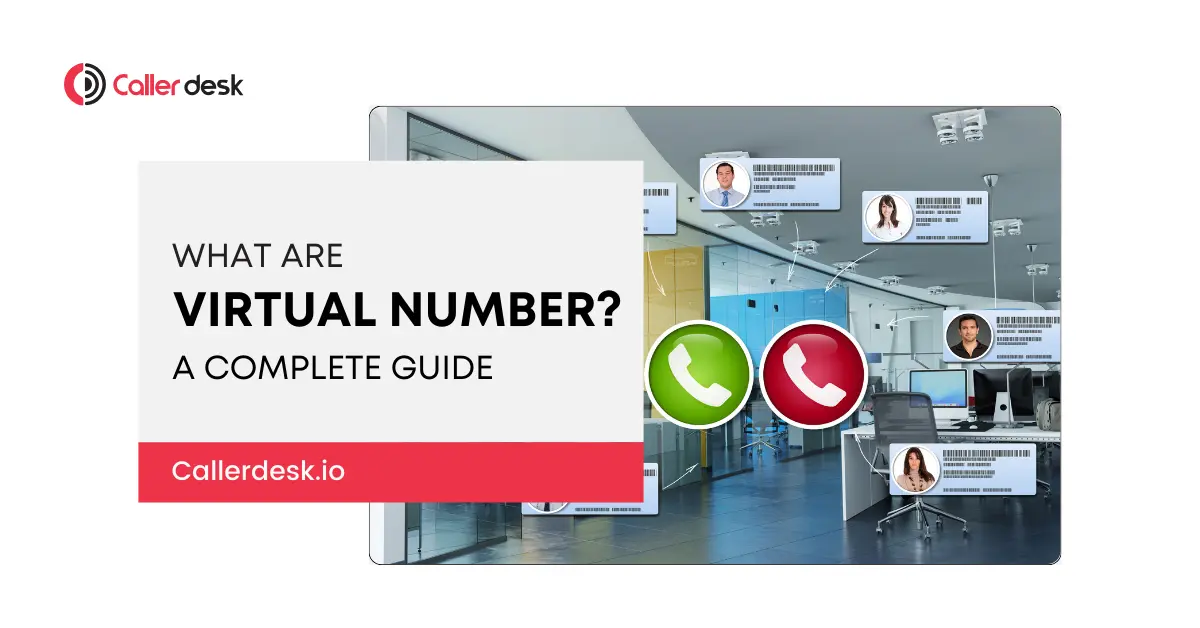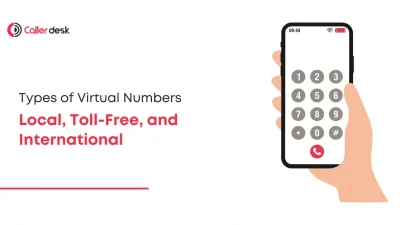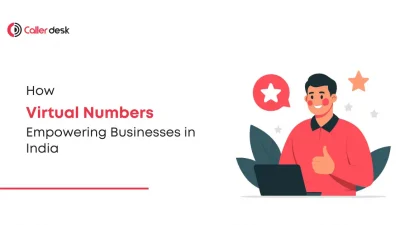Imagine if your business could have a phone number that isn’t tied to a SIM card or a landline. A number that works on any device—your mobile, laptop, or even your company’s customer support software. Sounds futuristic? Well, it’s already here!
- 1 What Are Virtual Numbers?
- 2 How Do Virtual Numbers Work?
- 3 Why Are Virtual Numbers Popular in India?
- 4 Types of Virtual Numbers
- 5 Top Benefits of Using Virtual Numbers for Businesses
- 6 Use Cases of Virtual Numbers in Different Industries
- 7 How to Get a Virtual Number in India
- 8 Conclusion
- 9 Frequently asked questions
Virtual numbers – a must have thing for businesses in India. Whether you run a small business, a startup, or a large enterprise, a virtual number for business lets you stay connected with customers without needing a physical phone line.
More and more companies are using virtual number services because they’re flexible, cost-effective, and make communication easy. Whether you need a virtual number in India for customer support, marketing, or managing multiple teams, this guide will show you exactly how they work, their benefits, and how you can get one for your business.
What Are Virtual Numbers?
A virtual number is a phone number that works over the internet instead of a traditional SIM card. It’s not linked to any specific device, so you can answer calls from anywhere-your phone, laptop, or office system.
Many businesses use virtual numbers to handle customer queries without being limited to one location. For example, an e-commerce company in Mumbai can use a virtual number to receive calls from customers all over the country.
A virtual number means you don’t have to rely on a fixed phone line. You can set up call forwarding, automated responses (IVR), and even SMS services to enhance communication.
How Do Virtual Numbers Work?
Here’s how a virtual number works in four simple steps:
Step 1: Customer dials your virtual number
The customer dials your virtual number, just like they would any regular phone number.
Step 2: Cloud technology routes the call
The call is routed over the internet using secure cloud technology, bypassing traditional telecom infrastructure for faster and more reliable connectivity.
Step 3: Call reaches your chosen device
The system forwards the call to your chosen device—be it a smartphone, landline, or your customer care team’s dashboard—based on your setup.
Step 4: Seamless Communication
You answer the call and engage with the customer. The process is completely transparent to them, as they are unaware of your location or the technical configuration.
Whether you’re using a virtual number for business or customer support, the process is smooth, fast, and reliable.
Why Are Virtual Numbers Popular in India?
The demand for virtual numbers in India is growing fast, and for good reason! Here’s why businesses are making the switch:
1. Establish a Strong Local Presence
Customers feel more comfortable dialing a local number than a long-distance or international one. Virtual numbers allow businesses to:
- Build trust and make it easier for customers to reach out.
- Establish a local presence in multiple regions.
2. Cost Savings
With a virtual number businesses can:
- Cut down on telecom costs.
- Avoid buying extra phones or SIM cards.
- Set up multiple call-forwarding options to handle high call volumes.
3. Flexibility for Remote Work
A virtual number lets you answer calls from any device. Whether you’re working from home, traveling, or managing a remote team, you stay connected.
4. Look More Professional
A virtual number for business gives you:
- A dedicated business contact number instead of a personal one.
- A toll-free or local business number to enhance credibility.
- Features like IVR (press 1 for sales, press 2 for support) for better call management.
Types of Virtual Numbers
Different businesses need different types of virtual number services. Here are the most popular options:
1. Local Virtual Numbers
- Have city-based codes like +91-22 (Mumbai) or +91-80 (Bengaluru).
- Ideal for businesses targeting a specific city.
- Builds trust with local customers.
2. Toll-Free Virtual Numbers
- Numbers like 1800-XXX-XXXX, where customers can call you for free.
- Perfect for boosting customer inquiries, as cost is not a barrier.
- Commonly used by customer service teams to handle large call volumes.
3. International Virtual Numbers
- Allows businesses to have a presence in other countries.
- Perfect for companies serving global customers.
- No need for a physical office abroad.
4. Vanity Numbers
- Easy-to-remember numbers like 1800-BUY-NOW or 1800-TRAVEL.
- Enhances brand recognition and leaves a lasting impression on customers.
Top Benefits of Using Virtual Numbers for Businesses
Virtual numbers offer unparalleled advantages, particularly for India’s diverse and dynamic business landscape:
1. Save Money on Communication
Traditional phone lines come with extra costs—SIM cards, multiple phones, and high call charges. A virtual number provider lets you:
- Avoid hardware and maintenance costs that come with traditional phone systems.
- Use a single virtual number across different devices—no need to buy extra phones.
- Forward calls to any phone, anywhere, without expensive call forwarding charges.
2. Seamless Scalability
Growing businesses need flexible communication systems. With a virtual number for business, you can:
- Handle higher call volumes without upgrading expensive telecom infrastructure.
- Add new virtual numbers without waiting for SIM cards or physical phone setups.
- Expand to multiple cities with local business phone number options.
3. Enhanced Customer Experience
When customers call, they don’t want to be kept on hold or sent to the wrong department. A virtual number makes call handling faster and smarter:
- Call forwarding lets employees answer from any location, ensuring no call is missed.
- Call routing ensures customers reach the right person instantly.
- IVR (Interactive Voice Response) allows them to press 1 for sales, 2 for support, etc.
4. Work from Anywhere, Anytime
With a virtual number, your office can be wherever you are. This is perfect for businesses with:
- Multiple locations-whether in Mumbai, Delhi, or Bengaluru, one virtual number keeps everything connected.
- Remote teams who need a business number India to stay connected.
- Work-from-home employees who can receive customer calls on their phones.
5. Get Data & Insights to Improve Your Business
Want to know how many calls you get daily? Who your top customers are? Virtual number give you real-time analytics to:
- See which marketing campaigns bring in the most calls.
- Track missed calls and response times to improve customer service.
- Measure call volume trends to plan staffing better.
Use Cases of Virtual Numbers in Different Industries
1. E-commerce and Startups:
- Provide a single contact number for customer inquiries, returns, and complaints.
- Streamline communication for a smoother customer experience.
2. Education and Coaching Centers:
- Toll-free numbers simplify the admission process for parents and students, encouraging inquiries without cost concerns.
3. Travel and Hospitality:
- Manage bookings, reservations, and customer support efficiently with centralized call routing.
4. Real Estate:
- Assign virtual numbers to specific agents or property listings to handle inquiries effectively.
5. Healthcare:
- Use virtual numbers for appointment scheduling, patient follow-ups, and telemedicine consultations.
How to Get a Virtual Number in India
Getting a virtual number in India is quick and easy. Follow these simple steps to set up your Virtual number and start handling calls without any hassle.
Step 1: Choose a Reliable Provider
The first step is to find a reliable virtual number provider. Look for a company that offers:
- Easy setup and support to get started without technical difficulties.
- Affordable plans for startups and businesses.
- Call management features like call forwarding, IVR, and voicemail.
Step 2: Pick the Right Type of Virtual Number
Depending on your business needs, choose from these options:
- Local Virtual Number– Ideal for businesses that want a local presence in specific cities. Example: +91-22 (Mumbai) or +91-80 (Bengaluru).
- Toll-Free Virtual Number– Helps businesses provide free calling options for customers, boosting inquiries and trust. Example: 1800-XXX-XXXX.
- International Virtual Number – Expands your business globally without needing a physical office abroad.
Each type of virtual number serves a different purpose, so pick the one that best suits your business goals.
Step 3: Set Up Your System
Once you’ve selected your virtual number provider, configure your number with key features to improve communication:
- Call Routing: Forward calls to the right person or department automatically.
- IVR Menus: Allow customers to select options like “Press 1 for Sales, Press 2 for Support” to streamline call handling.
- Voicemail: Ensure no call goes unanswered by letting customers leave messages.
These features make your virtual number for business more efficient and help provide better customer service.
Step 4: Activate and Use
After setting up your system, activate your virtual number and start receiving calls instantly.
- Take calls from anywhere—your mobile, office phone, or software dashboard.
- Manage high call volumes without missing customer inquiries.
- Track call logs and analytics to improve communication and customer experience.
A virtual number means your business stays connected 24/7, no matter where you or your team are located.
Conclusion
Virtual number provide a cost-effective, flexible, and scalable way to manage customer calls without being tied to a physical phone line.
With a virtual number, businesses can:
- Handle customer calls easily, no matter where their team is located.
- Improve call management with features like call routing, IVR, and voicemail.
- Establish a strong local, toll-free, or international presence to build customer trust.
For startups, SMEs, and large enterprises, a virtual number for business ensures better communication, enhanced efficiency, and a professional brand image.
If you’re looking for a trusted virtual number provider in India, CallerDesk offers tailored solutions to help businesses stay connected and grow. Start using a virtual number today and take your business communication to the next level!
Frequently asked questions
1. What is a virtual number?
A virtual number is a phone number that works over the internet, letting businesses answer calls from anywhere.
2. Can I use a virtual number for SMS?
Yes! A virtual number SMS feature allows businesses to send and receive messages.
3. How much does a virtual number cost?
Costs vary, but a virtual number provider in India offers affordable plans for businesses of all sizes.
4. How much do virtual numbers cost?
Virtual numbers are typically more affordable than traditional telecom setups. Costs vary based on features and usage, but they’re ideal for businesses of all sizes.
5. Can I integrate virtual numbers with my existing CRM system?
Absolutely. Virtual numbers can be integrated with CRM systems to streamline customer interactions and enhance team productivity.





